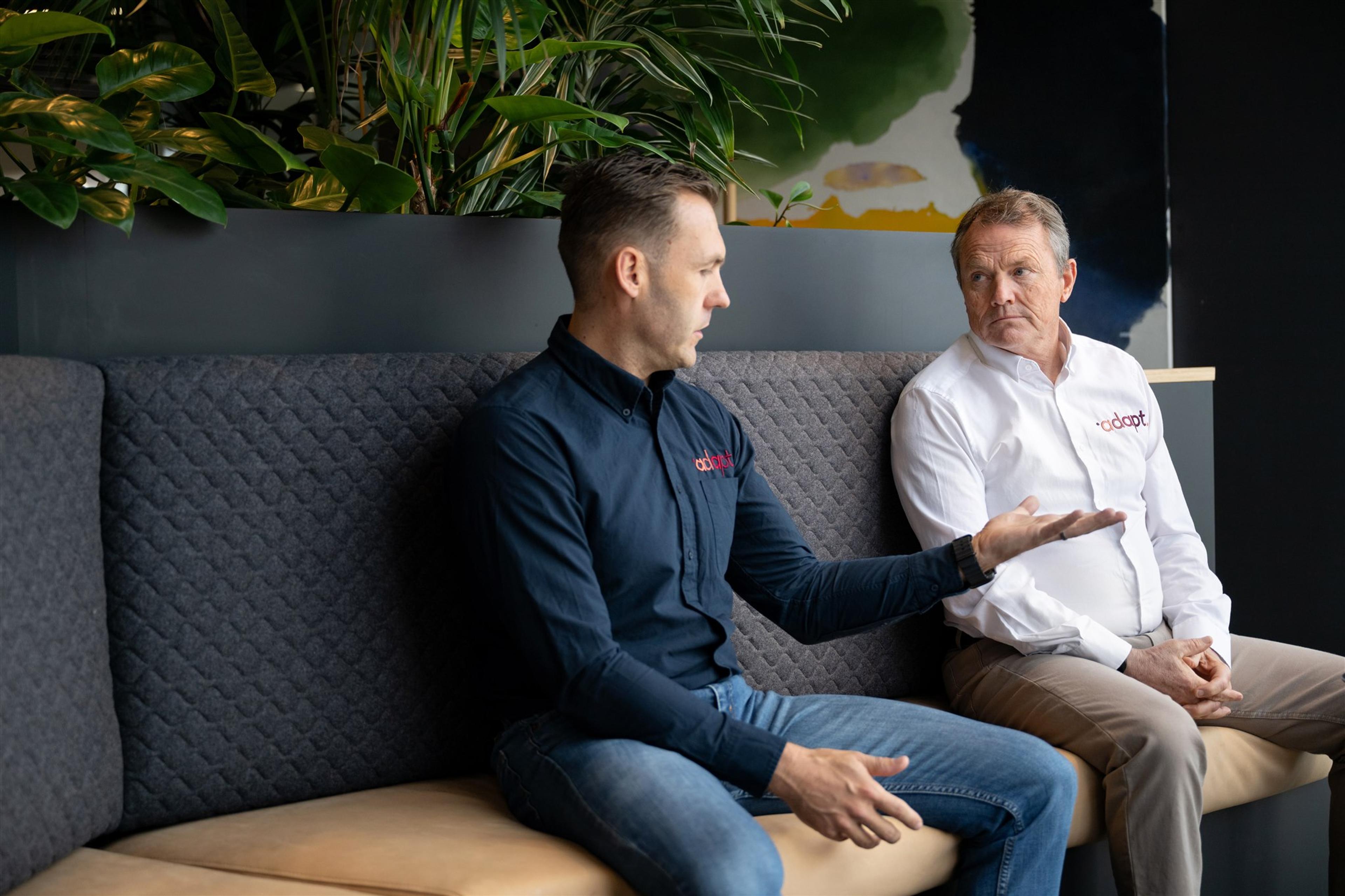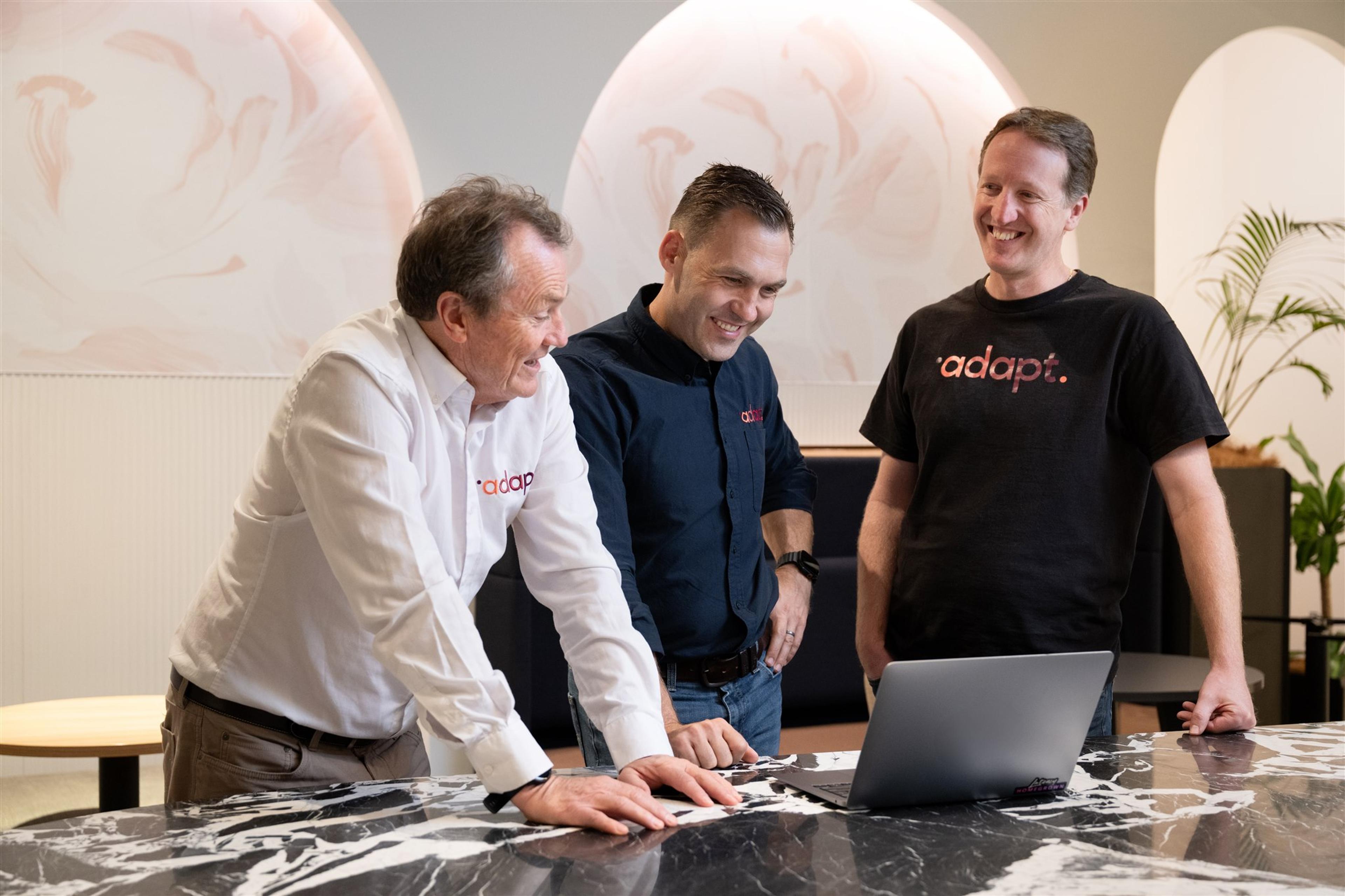The Leadership Coaching Advantage

Leadership coaching has become a cornerstone for organisations aiming to navigate challenges, seize opportunities, and drive meaningful growth. As businesses strive to remain competitive and innovative, the demand for skilled, adaptive leaders has never been higher. Leadership coaching offers a proven path to developing these leaders by focusing on enhancing their decision-making, emotional intelligence, and strategic thinking.
At adapt, we understand that strong leadership doesn’t just benefit individuals—it transforms entire organisations. Coaching fosters growth at the leadership level and improves team dynamics, communication, and overall productivity, creating a ripple effect that touches every aspect of the business. Investing in leadership coaching builds a resilient foundation for the future.
Building Stronger Organisations with Leadership Coaching
Leadership coaching is no longer a luxury reserved for top executives—it’s a necessity for organisations that want to remain competitive. Leadership coaching has become a powerful catalyst for organisational growth and resilience by equipping leaders with the tools to make better decisions, communicate effectively, and inspire their teams.
Understanding the leadership coaching advantage
Leadership coaching is a structured process that helps leaders identify their strengths, overcome challenges, and unlock their full potential. In a rapidly changing business environment, organisations need leaders who can adapt, innovate, and guide their teams through uncertainty. Coaching provides a clear framework for developing these essential skills, ensuring leaders are prepared to meet the demands of their roles.
Benefits for leaders and organisations
Leadership coaching offers distinct benefits for both individual leaders and the organisations they serve. For leaders, it enhances self-awareness, builds confidence, and sharpens decision-making skills. They gain a clearer understanding of their leadership style and learn how to navigate complex situations with poise and clarity.
For organisations, the impact is equally transformative. Effective leadership coaching improves team dynamics, strengthens communication, and fosters a culture of collaboration. These changes ripple through the organisation, leading to higher engagement, better performance, and stronger business outcomes.
Investing in leadership coaching develops individual leaders and builds a stronger, more agile organisation. Prioritising leadership development enables organisations to position themselves for sustained success, no matter what challenges lie ahead.
What is Executive Leadership Coaching?
Executive leadership coaching is a tailored, one-on-one process designed to help leaders enhance their skills, address challenges, and achieve specific goals. It focuses on empowering leaders to discover their potential, navigate complexities, and drive their organisations forward. Unlike other forms of professional development, coaching is not about delivering advice or solutions—it’s about guiding leaders to uncover their own insights and capabilities.
How executive leadership coaching differs from mentoring or consulting?
While mentoring and consulting are valuable, they serve different purposes compared to coaching. Mentoring relies on sharing personal experiences to guide someone’s journey, often offering advice based on similar challenges. Consulting, on the other hand, provides expert solutions to address specific business problems.
Coaching is distinct because it focuses on self-discovery and personal growth. A coach doesn’t tell leaders what to do but instead facilitates conversations that help them identify their goals, explore new perspectives, and develop strategies to overcome obstacles. This approach ensures that solutions are not only effective but also aligned with the leader’s values and organisational context.
The role of coaches in leadership development
An executive leadership coach acts as a trusted partner and advisor. They bring an objective perspective and a wealth of expertise to help leaders develop self-awareness, set clear goals, and refine their skills. A great coach listens intently, asks thought-provoking questions, and provides constructive feedback, enabling leaders to grow in confidence and capability.
Coaching is a dynamic process that adapts to the needs of the leader. Whether it’s navigating a major transition, enhancing strategic thinking, or improving communication, the coach supports the leader in applying new skills in real-world situations. This hands-on approach makes coaching an invaluable tool for leadership development, fostering growth that benefits both the individual and the organisation.
The Benefits of Executive Leadership Coaching for Leaders and Teams
Executive leadership coaching delivers far-reaching benefits, enhancing the capabilities of individual leaders while positively influencing their teams and organisations. Coaching’s focus on personal growth, team dynamics, and overall organisational impact creates a ripple effect that drives sustainable success.
Individual growth: Enhancing self-awareness and leadership abilities
Leadership coaching empowers leaders to better understand their strengths, weaknesses, and blind spots. With greater self-awareness, leaders can make more informed decisions, communicate more effectively, and navigate challenges with confidence. Coaching also sharpens critical skills such as emotional intelligence, adaptability, and resilience—traits essential for effective leadership in any context.
Team improvement: Boosting communication, collaboration, and performance
Leadership coaching doesn’t stop at individual development; it extends to how leaders engage with their teams. When leaders grow, their teams benefit in multiple ways:
1. Improved communication: Coaching helps leaders articulate their vision clearly, ensuring their teams understand goals and expectations.
2. Stronger collaboration: Leaders learn to foster a culture of trust and cooperation, encouraging teams to work more cohesively.
3. Enhanced performance: By addressing team challenges and aligning individual contributions with organisational objectives, coaching drives measurable improvements in team outcomes.
Organisational impact: The ripple effect of effective leadership
The benefits of coaching extend beyond individuals and teams, creating a positive ripple effect throughout the organisation. When leaders model effective behaviours, they inspire their teams, boost employee engagement, and set a standard for excellence. Over time, this leads to:
- Increased productivity and innovation.
- Higher levels of employee satisfaction and retention.
- A stronger organisational culture that supports continuous improvement.
Executive leadership coaching is a powerful tool that transforms leaders and the teams and organisations they serve. Investing in coaching allows businesses to create a culture of growth, resilience, and success that drives long-term results.
What Makes a Great Leadership Coach?
The effectiveness of leadership coaching largely depends on the coach’s ability to connect with the leader, understand their unique challenges, and provide tailored support. A great leadership coach possesses a combination of experience, skills, and personal qualities that enable them to guide leaders toward meaningful growth.
Key qualities of an effective coach
A truly impactful leadership coach brings a combination of expertise, credibility, and exceptional interpersonal skills. Key qualities include:
- Experience: A great coach has a strong professional background, often with first-hand leadership experience, which enables them to understand the complexities leaders face.
- Credibility: Their track record and reputation inspire confidence in their abilities and advice.
- Communication Skills: The ability to listen actively, ask insightful questions, and provide constructive feedback is critical for building trust and fostering growth.
The importance of a good fit between coach and leader
Successful coaching relies heavily on the relationship between the coach and the leader. The right coach understands the leader’s goals, organisational context, and personal challenges. They establish a strong rapport, creating an environment of trust and open communication. When the fit is right, coaching becomes a partnership that drives lasting, significant change.
Why certification and methodologies matter
A great leadership coach does not only rely on instinct—they follow proven methodologies and adhere to professional standards. Certifications from respected organisations, such as the International Coaching Federation (ICF), indicate that a coach has undergone rigorous training and adheres to a code of ethics. These credentials ensure that the coaching process is professional, effective, and aligned with the leader’s needs.
Leadership coaching is only as effective as the person delivering it. Choosing a coach with the right mix of experience, skills, and alignment with the leader’s goals can make all the difference in achieving transformational results.

How Leadership Coaching Contributes to Leadership Development
Leadership development is a continuous journey, and coaching plays a critical role in shaping leaders who can overcome challenges, inspire teams, and drive organisational success. Leadership coaching becomes an invaluable asset for leaders and organisations alike by honing essential skills, fostering long-term growth, and providing real-world impact.
Leadership skills enhancement: Strategic thinking, decision-making and resilience
Effective leadership demands a wide range of skills, and coaching provides a focused environment to develop them. Through coaching, leaders enhance their ability to think strategically, make sound decisions under pressure, and build the resilience needed to overcome obstacles. These skills are not only critical for individual performance but also for guiding teams and organisations through uncertainty and change.
Long-term leadership growth through coaching
Leadership coaching isn’t a quick fix—it’s an investment in sustainable development. Coaches help leaders identify their strengths and areas for improvement, offering personalised strategies to address both. Over time, this process builds self-awareness and equips leaders with the tools to manage their weaknesses while maximising their strengths. The result is long-term growth.
The Leadership Coaching Process: From Initial Assessment to Transformation
Leadership coaching is a journey that begins with understanding the leader’s current position and progresses toward meaningful, measurable change. At Adapt, we’ve refined our coaching process to ensure it’s tailored, impactful, and aligned with the unique needs of each leader and organisation. Here’s how our approach works.
Starting with assessments and goal setting
Every coaching engagement at Adapt begins with a thorough assessment. This step helps us evaluate a leader’s strengths, identify areas for growth, and uncover the challenges they face. Using tools like 360-degree feedback, personality assessments, and direct conversations, we gain a holistic view of the leader’s current capabilities and aspirations.
From there, we work together to set clear, actionable goals. These goals form the foundation of the coaching process, ensuring that every session is focused on achieving meaningful outcomes.
The phases of coaching: Discover, learn apply
Our coaching process follows a structured yet flexible approach:
1. Discover: We dig deep into the leader’s context, challenges, and ambitions. Through thoughtful questioning and active listening, we uncover the root causes of barriers and identify opportunities for growth.
2. Learn: In this phase, leaders develop new skills, strategies, and perspectives. At Adapt, we guide them through practical exercises, role-playing, and real-world scenarios to ensure they can apply what they’ve learned.
3. Apply: The final phase focuses on integrating new skills into daily practice. Leaders receive ongoing support as they implement changes, navigate challenges, and refine their approach.
This cycle is iterative and adaptable, ensuring continuous improvement and sustained progress.
Measuring success through feedback and results
At adapt, we believe that coaching success should be tangible and trackable. We incorporate regular feedback sessions and progress reviews to ensure that leaders stay on course. We provide leaders with a clear picture of their growth by tracking milestones, evaluating behavioural changes, and measuring the impact on team and organisational performance.
Our approach doesn’t just deliver short-term wins—it builds lasting capabilities. The transformation we help leaders achieve extends beyond the individual, creating positive ripple effects across their teams and the organisation as a whole.
From initial assessments to ongoing feedback, we partner with leaders every step of the way, helping them discover, learn, and apply the skills needed to succeed.
Executive Coaching: Is it Right for Your Organisation?
Leadership coaching is a powerful tool, but its effectiveness depends on how well it aligns with the specific needs and culture of your organisation. At Adapt, we work closely with businesses to tailor coaching programmes that address their unique challenges and goals. Here’s how to determine if executive coaching is the right investment for your organisation.
Tailoring coaching to fit organisational needs and culture
Every organisation has its own identity, priorities, and challenges. That’s why coaching must be customised to fit the specific context in which leaders operate. At Adapt, we take the time to understand your organisational culture, values, and goals. This ensures that our coaching aligns seamlessly with your broader objectives and helps leaders develop skills that directly impact your organisation’s success.
Signs your organisation would benefit from leadership coaching
Executive coaching can make a significant difference in several scenarios. Consider if any of these apply to your organisation:
- Leadership transitions: Are you promoting new leaders or undergoing a management restructure? Coaching helps leaders step into their roles with confidence and clarity.
- Performance challenges: Are teams struggling with engagement, communication, or collaboration? Coaching equips leaders with the tools to address these issues effectively.
- Strategic growth: Are you entering new markets, scaling operations, or tackling ambitious goals? Coaching provides the strategic insight and leadership skills needed to navigate these transitions successfully.
If your organisation faces these or similar challenges, executive coaching can provide the support and guidance to overcome them.
Measuring ROI: Success beyond the individual level
The return on investment (ROI) for leadership coaching extends far beyond individual leaders. We measure success by looking at tangible outcomes such as:
- Improved team performance: Leaders who communicate better and foster collaboration drive stronger results across their teams.
- Enhanced employee engagement: A culture of effective leadership boosts morale, satisfaction, and retention.
- Organisational outcomes: From increased profitability to greater innovation, leadership coaching contributes to measurable business success.
We’re here to help you determine if coaching is the right step for your business and to design a programme that delivers results where they matter most. Reach out to explore how we can support your organisation’s journey toward growth and success.
Key Challenges and Considerations in Effective Coaching
While executive coaching offers significant benefits, it’s important to acknowledge and address the challenges that can arise. We work closely with leaders and organisations to overcome these obstacles, ensuring the coaching process is both effective and impactful.
Overcoming common misconceptions about coaching
One of the biggest challenges in executive coaching is addressing misconceptions about its purpose. For example, some believe coaching is only for underperforming leaders or those struggling with their roles. In reality, coaching is a powerful tool for leaders at all levels, designed to enhance performance, foster growth, and prepare for future challenges.
Another common misconception is that coaching provides quick fixes. At Adapt, we emphasise that coaching is a process focused on long-term development, requiring commitment and effort from both the leader and the coach.
Addressing resistance to coaching
Not all leaders welcome coaching immediately. Resistance can stem from various factors, such as:
- Concerns about vulnerability: Some leaders may hesitate to openly discuss challenges or admit areas for improvement.
- Perceived lack of time: Busy leaders might feel they don’t have the bandwidth to engage fully in coaching.
Our policy is to address resistance by clearly communicating the benefits of coaching and creating a safe, non-judgmental environment where leaders feel supported. We also work to integrate coaching seamlessly into a leader’s schedule, making it a practical part of their development.
The Importance of clear expectations and a supportive environment
Successful coaching depends on setting clear expectations from the start. Leaders need to understand the goals, processes, and outcomes of coaching to stay committed and engaged. We outline these expectations early on, ensuring alignment between the leader, coach, and organisation.
Equally important is fostering a supportive organisational environment. When organisations prioritise coaching and actively champion its value, leaders feel more encouraged to participate fully. This includes respecting confidentiality, celebrating progress, and reinforcing the importance of leadership development. Executive coaching comes with its challenges, but with the right approach, they can be effectively managed.
Conclusion: Investing in Leadership Coaching for Sustainable Success
Leadership coaching is a tool for personal growth and an investment in the future of your organisation. Coaching creates a foundation for sustainable success by enhancing the skills of individual leaders, improving team dynamics, and driving organisational performance.
Leadership coaching brings measurable benefits at every level. For leaders, it fosters self-awareness, strategic thinking, and resilience. For teams, it improves communication, collaboration, and overall performance. And for organisations, it delivers stronger leadership, higher employee engagement, and better business outcomes. The ripple effects of effective coaching can transform a company’s culture and position it for long-term success.
Take the first step with adapt.
Adapt specialises in helping leaders and organisations unlock their potential through tailored coaching programmes. Whether you’re addressing leadership transitions, fostering a culture of continuous improvement, or preparing for ambitious growth, our coaches are here to guide you every step of the way.
Start your journey today by reaching out for a consultation or exploring our coaching services. Together, we’ll build the leadership capabilities your organisation needs to succeed now and in the future.




